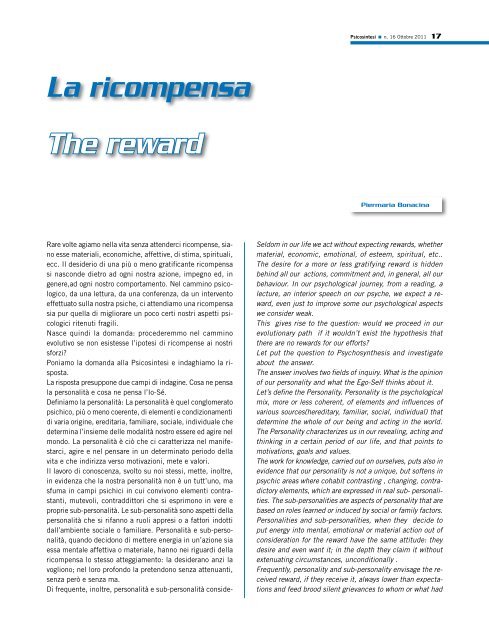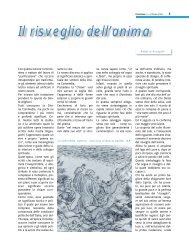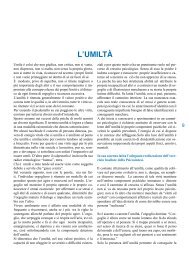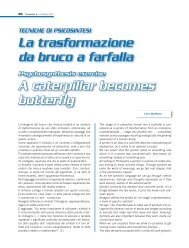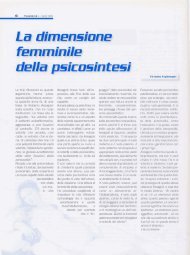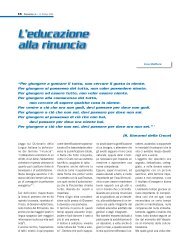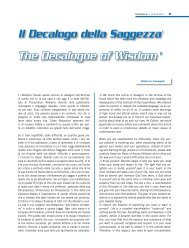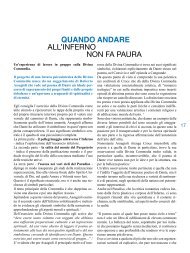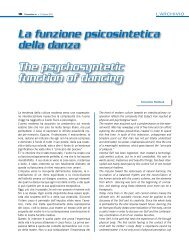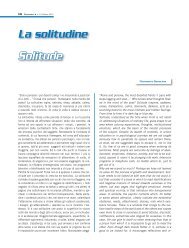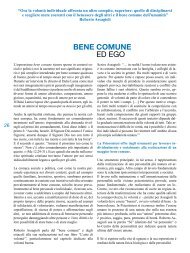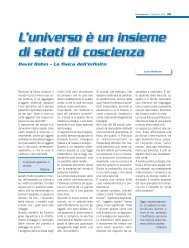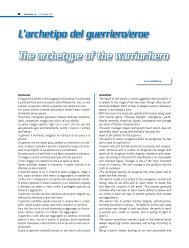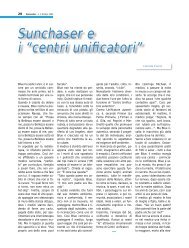Piermaria Bonacina - La ricompensa - Istituto di psicosintesi
Piermaria Bonacina - La ricompensa - Istituto di psicosintesi
Piermaria Bonacina - La ricompensa - Istituto di psicosintesi
Create successful ePaper yourself
Turn your PDF publications into a flip-book with our unique Google optimized e-Paper software.
<strong>La</strong> <strong>ricompensa</strong><br />
The reward<br />
Rare volte agiamo nella vita senza attenderci ricompense, siano<br />
esse materiali, economiche, affettive, <strong>di</strong> stima, spirituali,<br />
ecc. Il desiderio <strong>di</strong> una più o meno gratificante <strong>ricompensa</strong><br />
si nasconde <strong>di</strong>etro ad ogni nostra azione, impegno ed, in<br />
genere,ad ogni nostro comportamento. Nel cammino psicologico,<br />
da una lettura, da una conferenza, da un intervento<br />
effettuato sulla nostra psiche, ci atten<strong>di</strong>amo una <strong>ricompensa</strong><br />
sia pur quella <strong>di</strong> migliorare un poco certi nostri aspetti psicologici<br />
ritenuti fragili.<br />
Nasce quin<strong>di</strong> la domanda: procederemmo nel cammino<br />
evolutivo se non esistesse l’ipotesi <strong>di</strong> ricompense ai nostri<br />
sforzi?<br />
Poniamo la domanda alla Psicosintesi e indaghiamo la risposta.<br />
<strong>La</strong> risposta presuppone due campi <strong>di</strong> indagine. Cosa ne pensa<br />
la personalità e cosa ne pensa l’Io-Sé.<br />
Definiamo la personalità: <strong>La</strong> personalità è quel conglomerato<br />
psichico, più o meno coerente, <strong>di</strong> elementi e con<strong>di</strong>zionamenti<br />
<strong>di</strong> varia origine, ere<strong>di</strong>taria, familiare, sociale, in<strong>di</strong>viduale che<br />
determina l’insieme delle modalità nostro essere ed agire nel<br />
mondo. <strong>La</strong> personalità è ciò che ci caratterizza nel manifestarci,<br />
agire e nel pensare in un determinato periodo della<br />
vita e che in<strong>di</strong>rizza verso motivazioni, mete e valori.<br />
Il lavoro <strong>di</strong> conoscenza, svolto su noi stessi, mette, inoltre,<br />
in evidenza che la nostra personalità non è un tutt’uno, ma<br />
sfuma in campi psichici in cui convivono elementi contrastanti,<br />
mutevoli, contrad<strong>di</strong>ttori che si esprimono in vere e<br />
proprie sub-personalità. Le sub-personalità sono aspetti della<br />
personalità che si rifanno a ruoli appresi o a fattori indotti<br />
dall’ambiente sociale o familiare. Personalità e sub-personalità,<br />
quando decidono <strong>di</strong> mettere energia in un’azione sia<br />
essa mentale affettiva o materiale, hanno nei riguar<strong>di</strong> della<br />
<strong>ricompensa</strong> lo stesso atteggiamento: la desiderano anzi la<br />
vogliono; nel loro profondo la pretendono senza attenuanti,<br />
senza però e senza ma.<br />
Di frequente, inoltre, personalità e sub-personalità conside-<br />
Psicosintesi < n. 16 Ottobre 2011 17<br />
<strong>Piermaria</strong> <strong>Bonacina</strong><br />
Seldom in our life we act without expecting rewards, whether<br />
material, economic, emotional, of esteem, spiritual, etc..<br />
The desire for a more or less gratifying reward is hidden<br />
behind all our actions, commitment and, in general, all our<br />
behaviour. In our psychological journey, from a rea<strong>di</strong>ng, a<br />
lecture, an interior speech on our psyche, we expect a reward,<br />
even just to improve some our psychological aspects<br />
we consider weak.<br />
This gives rise to the question: would we proceed in our<br />
evolutionary path if it wouldn’t exist the hypothesis that<br />
there are no rewards for our efforts?<br />
Let put the question to Psychosynthesis and investigate<br />
about the answer.<br />
The answer involves two fields of inquiry. What is the opinion<br />
of our personality and what the Ego-Self thinks about it.<br />
Let’s define the Personality. Personality is the psychological<br />
mix, more or less coherent, of elements and influences of<br />
various sources(here<strong>di</strong>tary, familiar, social, in<strong>di</strong>vidual) that<br />
determine the whole of our being and acting in the world.<br />
The Personality characterizes us in our revealing, acting and<br />
thinking in a certain period of our life, and that points to<br />
motivations, goals and values.<br />
The work for knowledge, carried out on ourselves, puts also in<br />
evidence that our personality is not a unique, but softens in<br />
psychic areas where cohabit contrasting , changing, contra<strong>di</strong>ctory<br />
elements, which are expressed in real sub- personalities.<br />
The sub-personalities are aspects of personality that are<br />
based on roles learned or induced by social or family factors.<br />
Personalities and sub-personalities, when they decide to<br />
put energy into mental, emotional or material action out of<br />
consideration for the reward have the same attitude: they<br />
desire and even want it; in the depth they claim it without<br />
extenuating circumstances, uncon<strong>di</strong>tionally .<br />
Frequently, personality and sub-personality envisage the received<br />
reward, if they receive it, always lower than expectations<br />
and feed brood silent grievances to whom or what had
18 Psicosintesi < n. 16 Ottobre 2011<br />
rano la <strong>ricompensa</strong> ricevuta, se la ricevono, sempre inferiore<br />
alle aspettative e rimuginano silenziose rimostranze verso<br />
chi o che cosa doveva darla: l’energia impegnata meritava<br />
<strong>di</strong> più; lo sforzo per partecipare ad eventi culturali in vari<br />
campi dello scibile umano meritava maggior nutrimento <strong>di</strong><br />
conoscenza; gli esercizi psicologici proposti non producevano<br />
mai del tutto il cambiamento atteso; le preghiere e i fioretti<br />
apportavano assai <strong>di</strong> rado i mutamenti esistenziali desiderati.<br />
Anche il Para<strong>di</strong>so rientra nelle<br />
contrattazioni della personalità:<br />
i patti sono chiari “Do affinché<br />
Tu mi <strong>di</strong>a”.<br />
Personalità e sub-personalità<br />
proseguono nel corso dell’esistenza<br />
con il con<strong>di</strong>zionamento<br />
appreso alla scuola materna e<br />
alle elementari: stu<strong>di</strong>o e faccio i<br />
compiti per avere la <strong>ricompensa</strong><br />
<strong>di</strong> un bel voto, l’apprezzamento<br />
della maestra e un regalo dalla<br />
mamma. Nel corso della vita<br />
mutano i campi <strong>di</strong> stu<strong>di</strong>o e impegno<br />
ma il con<strong>di</strong>zionamento<br />
appreso rimane inalterato. In<br />
tutto ciò non vi è nulla <strong>di</strong> riprovevole.<br />
L’importante, nel cammino<br />
psicologico, è comunque<br />
sapere che la <strong>ricompensa</strong> non è<br />
un effetto ma è la causa, il primum<br />
movens della personalità<br />
e delle sub-personalità.<br />
Spostiamo ora l’attenzione<br />
sull’Io-Sé. L’Io-Sé è l’essenza<br />
dell’uomo e l’Io, quale si manifesta<br />
nella coscienza or<strong>di</strong>naria,<br />
è un suo riflesso, un suo<br />
avamposto, una sua energia,<br />
che scende nel tempo e nello<br />
spazio terreno per accompagnarci<br />
e <strong>di</strong>rigerci. L’Io persona-<br />
to give: the energy involved could deserve more, the effort to<br />
take part in cultural events in various fields of human knowledge<br />
should have been more aware of nutrition: proposed<br />
psychological exercises never fully produced the expected<br />
change; prayers and acts of mortification rarely brought the<br />
desired exsistential changes. The Para<strong>di</strong>se too is a part of<br />
the negotiations of personality: the terms are clear:<br />
“I give something to You and You you give something to<br />
me”.<br />
Personality and sub-personality<br />
continue during the existence<br />
with the con<strong>di</strong>tioning learned<br />
in nursery school and primary<br />
school: we study and we do our<br />
homework to get the reward of<br />
a good grade, the teacher’s appreciation<br />
and a gift from our<br />
mother. During our life fields of<br />
study and effort change,, but<br />
learned con<strong>di</strong>tioning remains<br />
unchanged. There is nothing<br />
objectionable about it. What is<br />
important, in the psychological<br />
journey, is still to know that the<br />
reward is not an effect but the<br />
cause, the “primum movens”<br />
of personality and sub-personality.<br />
Let’s now move the focus on<br />
Ego-Self. The Ego-Self is the<br />
essence of man and Ego, as<br />
manifested in or<strong>di</strong>nary consciousness,<br />
is its reflection, its<br />
outpost, its energy, which decreases<br />
over time and space to<br />
accompany and <strong>di</strong>rect us. The<br />
The personal Self is the part of<br />
Self that allows us to find our<br />
way in the world and in ourseles<br />
along the stages in which<br />
le è quel tanto del Sé che permette<br />
all’uomo <strong>di</strong> orientarsi nel<br />
mondo e in se stesso durante gli<br />
sta<strong>di</strong> in cui la personalità gra-<br />
Rembrandt Van Rijn<br />
“ <strong>La</strong> Ronda <strong>di</strong> notte” (part.) 1642<br />
Amsterdam Rijksmuseum<br />
personality gradually takes<br />
shape, evolves and organizes<br />
in an integrated personality. In<br />
these developmental stages the<br />
dualmente prende forma, evolve e si organizza in personalità Ego-Self collaborates in driving the personality and allows<br />
integrata. L’Io-Sé in tali sta<strong>di</strong> evolutivi collabora nella guida us to pursue a deeper and essential existential awareness.<br />
della personalità e permette <strong>di</strong> raggiungere più profonde ed The “Test of Reward” is essential to perceive in ourselves the<br />
essenziali consapevolezze esistenziali. Per valutare l’acqui- acquisition of such evolutionary level, that means that the<br />
sizione <strong>di</strong> tale livello evolutivo, cioè se sta emergendo l’Io-Sé Ego-Self is emerging in us.<br />
in noi il “Test della <strong>ricompensa</strong>” è essenziale.<br />
An expansion of consciousness toward the Ego-Self is an op-<br />
Un’espansione <strong>di</strong> coscienza verso l’Io-Sé è un’occasione <strong>di</strong> portunity for congratulation. No other experience offers such<br />
cui congratularsi. Nessuna esperienza offre quella percezione perception of unlimited possibilities to build a continuum<br />
<strong>di</strong> possibilità illimitate <strong>di</strong> poter e<strong>di</strong>ficare una serie ininterrotta of steps, not for a reward, nor justice, but for the irrefuta-
<strong>di</strong> scalini, non per <strong>ricompensa</strong>, né per giustizia, ma per la<br />
legge incontestabile. Chi pensa che impegnarsi nel processo<br />
evolutivo sia uno sforzo che merita un premio, quale ad esempio<br />
l’apprezzamento altrui o il sentirsi superiori, non è certo<br />
<strong>ricompensa</strong>to da una espansione <strong>di</strong> coscienza. Le erbacce<br />
del compiacimento soffocano e annientano il suo Io-Sé.<br />
Dove cresce meglio l’energia psichica del Sé? Là dove si<br />
tende con forza all’azione impersonale per il bene comune<br />
e non si è troppo legati al presente per gingillarsi con il<br />
pesare le ricompense ricevute. Chi è avvolto dal desiderio<br />
<strong>di</strong> avere una contropartita non capisce l’importanza vitale<br />
del lavoro impersonale e vegeta senza futuro. Chi tende con<br />
tutte le forze al transpersonale, non considera ricompense.<br />
È triste quando qualcuno intravede le limpide possibilità del<br />
Sé eppure continua a sognare qualche magro premio. “Al<br />
servizio della virtù si vive gratuitamente”.<br />
Nell’avanzare in coscienza, si avanza colmi <strong>di</strong> gioia; se prende<br />
forma il pensiero <strong>di</strong> un premio si torna alla schiavitù del<br />
dominio della personalità o delle sub-personalità. Alcuni<br />
vorrebbero nascondere l’accattonaggio <strong>di</strong> una <strong>ricompensa</strong><br />
sotto una maschera <strong>di</strong> santità e <strong>di</strong>stacco dalle cose terrene<br />
con l’apparente rinuncia a ciò che nemmeno possiedono.<br />
L’evoluzione si costruisce solo con la coscienza libera, senza<br />
orgoglio e senza <strong>di</strong>sprezzo <strong>di</strong> sé.<br />
Non esistono premi o punizioni, solo conseguenze.<br />
È istruttivo leggere i contratti immaginari, più o meno inconsci,<br />
stipulati con Assagioli o con il cielo in cui deci<strong>di</strong>amo<br />
quale premio meritiamo per il nostro agire. Ignorando errori e<br />
inadempienze, spesso accusiamo quelli a cui ci appoggiamo<br />
<strong>di</strong> non rispettare gli accor<strong>di</strong>. Una santa libanese iniziava<br />
ogni orazione sussurrando a se stessa: “Fa che riesca a non<br />
chederTi nulla”<br />
Nella <strong>psicosintesi</strong> transpersonale forse <strong>di</strong> una <strong>ricompensa</strong> per<br />
la fatica del lavoro evolutivo è lecito parlare: parlo della gioia<br />
del lavoro e del segno impersonale dei propri conseguimenti<br />
che hanno adornato la scala della vita in senso evolutivo. Che<br />
altro può sostituire la gioia della crescita della coscienza? Le<br />
testimonianze e non le ricompense fissano il progresso.<br />
“Non aspettatevi <strong>ricompensa</strong>.<br />
I premi terreni non sono per voi<br />
che lottate e proseguite il sentiero con audacia,<br />
senza pensare ai pericoli né alla gioia futura.<br />
Ricordatevi ciò che vi <strong>di</strong>ssi.<br />
Non prendete il frutto migliore dalla tavola del Signore,<br />
neppure se ve lo offre.<br />
Prendete solo ciò che vi è dato per compiere<br />
la vostra missione.<br />
<strong>La</strong> <strong>ricompensa</strong> viene, ma chi l’aspetta non l’attira.” (Agni)<br />
È possibile chiamare eroe quel guerriero che entra in battaglia<br />
perché si attende un premio?<br />
<strong>La</strong> legge della <strong>ricompensa</strong> trionfa: chi dà riceve. Chiunque<br />
Psicosintesi < n. 16 Ottobre 2011 19<br />
ble law. Those who think that to engage themselves in the<br />
evolution process is an effort that deserves a prize, such as<br />
the appreciation of others or the feeling of superiority , are<br />
not rewarded with an expansion of consciousness. Weeds of<br />
delight choke and annihilate their Ego-Self.<br />
Where better groves the psychic energy of Self? Where we<br />
strongly towards the impersonal action for the common good<br />
and holdout we are not too tied to the present time to tinker<br />
with weighing rewards we receive. The one who is wrapped<br />
by a desire to have a compensation does not understand<br />
the vital importance of the impersonal work and vegetates,<br />
without a future. Those who aim with all their forces at the<br />
Transpersonal do not take into account rewards. It is sad<br />
when someone catches a glimpse of the clear possibility<br />
of Self and yet still dreams of some modest prize. “Serving<br />
virtue, we live free”.<br />
Advancing in consciousness, we advance filled with joy; if<br />
the thought of a premium takes form we come back to the<br />
slavery of the power of personality or sub-personalities. Some<br />
people would hide the begging of a reward under a mask of<br />
sanctity and detachment from earthly things with the apparent<br />
renunciation of something that they even do not possess.<br />
The evolution is built only with free consciousness, without<br />
pride and self-contempt.<br />
There are no rewards or punishments, only consequences.<br />
It is instructive to read the imaginary contracts, more or<br />
less unconscious, achieved with Assagioli or with the sky<br />
in which we decide what reward we deserve for our actions.<br />
Ignoring mistakes or non-fulfilments, often we accuse those<br />
who support us not to respect the agreements. A Lebanese<br />
Saint began her prayers whispering to herself: “Let me be<br />
able to ask You nothing”.<br />
In Transpersonal Psychosynthesis perhaps it is legitimate<br />
to speak of a reward for the hard work of evolution: I make<br />
reference to the joy for work and the impersonal sign of our<br />
own achievements which adorne the scale of life in an evolutionary<br />
sense. What else can replace the joy of the growth<br />
of consciousness? Testimonies and not rewards secure the<br />
progress.<br />
“Do not expect rewards.<br />
Wordly prizes are not for you<br />
You Who struggle and boldly go on your way ,<br />
without thinking of dangers or future joy.<br />
Remember what I told you.<br />
Do not take the best fruit from the table of the Lord,<br />
even if He offers it to you.<br />
Take only what is given you to accomplish<br />
your mission.<br />
Reward will come, but he who looks forward to will not<br />
get it.” (Agni)<br />
Is it possible to name”hero” the warrior who goes into a
20 Psicosintesi < n. 16 Ottobre 2011<br />
non si lagni del proprio lavoro sarà <strong>ricompensa</strong>to in abbondanza.<br />
Per concludere una storiella: “Un uomo dava molto denaro<br />
per opere <strong>di</strong> bene, ma si attendeva un compenso. Un giorno il<br />
suo Maestro gli mandò un sasso con queste parole: “Accetta<br />
in premio il tesoro della stella lontana”.<br />
L’uomo si in<strong>di</strong>gnò: “Mi viene data una pietra in cambio del<br />
mio oro! Che mi importa <strong>di</strong> una stella lontana?”. E avvilito<br />
gettò la pietra in un torrente <strong>di</strong> montagna. Ma venne<br />
il Maestro e gli <strong>di</strong>sse: “Ti è piaciuto il tesoro? Quel sasso<br />
contiene il più splen<strong>di</strong>do dei <strong>di</strong>amanti, ben più scintillante<br />
delle gemme terrene”. L’uomo <strong>di</strong>sperato corse al torrente, e<br />
seguendo il corso, <strong>di</strong>scese sempre più in basso. Ma quelle acque<br />
increspate gli nascosero per sempre il tesoro.” <<br />
Giovanni <strong>di</strong> Paolo (1399-1482)<br />
“Il Para<strong>di</strong>so” (part.) Siena, Pinacoteca<br />
battle because he expects a reward?<br />
The law of reward wins: those who give, receive. Anyone<br />
who does not complain of his work will be rewarded in<br />
abundance.<br />
Finally a funny story: A man gave a lot of money for works<br />
of mercy, but was awaiting for a reward. One day his teacher<br />
sent him a stone with these words:”Accept as a prize the<br />
treasure of the <strong>di</strong>stant star”.<br />
The man was angry: “I have been given a stone in exchange<br />
of my gold! I don’t care for a <strong>di</strong>stant star!” And, depressed,<br />
threw the stone into a mountain stream. But the Master came<br />
and said: “Did you like the treasure? That rock contains<br />
the most beautiful <strong>di</strong>amond, much more glittering than the<br />
earthly stones.” The man, desperate, ran to the river, and<br />
following the course, descended lower and lower. But the<br />
choppy waters hid the treasure forever.


